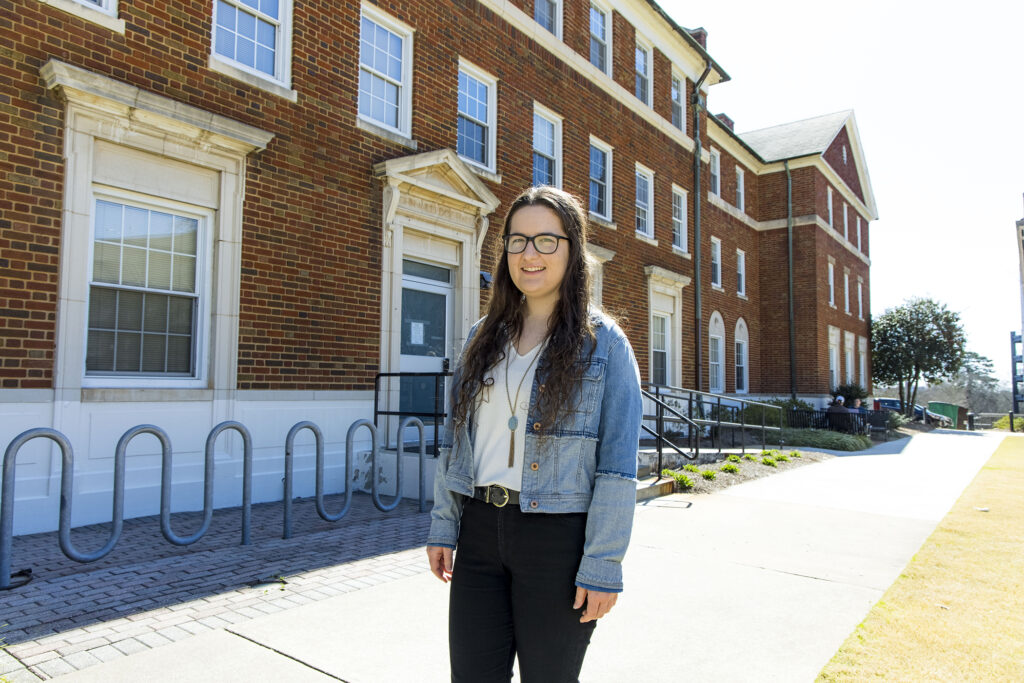Math can be frustrating, especially during a pandemic, but Maelyn Ehrman is here to help.
 “Math in general is a subject that can be really debilitating for students,” said Ehrman, who is an art major and graduates in May. “So I enjoy alleviating some of that frustration and helping my peers in that way.”
“Math in general is a subject that can be really debilitating for students,” said Ehrman, who is an art major and graduates in May. “So I enjoy alleviating some of that frustration and helping my peers in that way.”
Ehrman is a lead tutor for the peer tutoring branch of PLaTO (Peer Learning and Teaching Others), a program of the Division of Academic Enhancement. She has been helping her fellow University of Georgia students study since her first year on campus four years ago.
“I did tutoring in high school and enjoyed it,” she said. “I found out about the position through a work study job posting, and I’ve been involved with DAE ever since.”

Before the pandemic, students could drop into Milledge Hall or make an appointment for 50-minute tutoring sessions in one of 10 small rooms, each equipped with a whiteboard, a couple of desks and chairs, and a peer to help.
Precautions to prevent the spread of COVID-19 ended the in-person sessions, and as with many other campus programs, Ehrman had to figure out how to navigate Zoom.
“So the location is different, but the appointment itself is pretty much the same,” she said. “We start with a greeting, see what’s up, both with them as a student and in class, and they typically bring problems or concepts to talk about.”
Ehrman said they typically work through problem sets, but that each meeting has a goal. For example, a student might come in and say they have a quiz and do not understand a concept. Therefore, the goal for that session is to work together to understand the concept.
Peer tutors build relationships
“Sometimes as tutors we get repeat clients, which can be really fun, because I get to build a relationship with them over the semester and kind of make a new friend!” she said.
She said the initial transition to Zoom was challenging because she had gotten used to her in-person approach during the previous three-plus years. Typically, she would look over their shoulder to see what they were writing or look through their work and figure out where the answer went wrong, but now she had to adapt to new methods for remote sessions.
“I use a lot of the annotate function to write on the screen, just like I would’ve used a whiteboard,” she said. “My new catch phrase is ‘walk me through that,’ so I can look back through their work.”
After a handful of semesters conducting tutoring sessions remotely, Ehrman believes Zoom has been a good alternative, and she does not think Zoom will go away entirely once they return to in-person meetings.
To further assist DAE in the transition to remote student support, Ehrman created a video explaining how to sign up for online tutoring, started tutoring in courses PLaTO had previously not offered, and helped the communications team with marketing the program to students.
A desire to help people
Though she appears to have a passion for tutoring, Ehrman said she is not necessarily on a path to teaching or a professional tutoring role, but she does look forward to helping people.
“I’ve been involved in service organizations on campus and I just think it’s really rewarding work,” she said. “I’ll probably do some teaching of some sort – maybe continuing education or something like that.”
Though she is happy to help someone make a better grade or prepare for a test, her ultimate goal is to take some of the stress away.
“Math is already stressful,” Ehrman said. “Then add COVID, learning online – there’s just so many things going wrong right now, and I hope I’m helping take at least one of those things off of their plate.”


